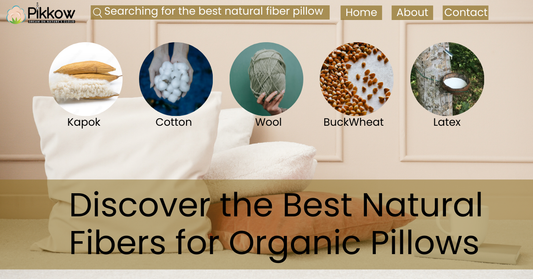When it comes to ensuring a comfortable, healthy sleep, selecting the right pillow can make all the difference. Organic pillows, made from the best natural fibers, have gained significant attention for their comfort, sustainability, and health benefits. Whether you’re looking for a soft, supportive pillow or one that helps you breathe easy, choosing the best natural organic pillows is crucial to your overall sleep quality.
In this guide, we’ll explore the best natural fibers for organic pillows, including their health advantages, environmental impact, and what makes them a top choice for eco-conscious consumers. If you’re considering switching to a more sustainable and comfortable pillow, this blog will help you discover the perfect option for your healthy sleep needs.
Why Natural Fibers Matter for Your Pillow
The materials used in pillows can significantly affect your sleep quality, health, and comfort. Synthetic pillows often contain chemicals or non-breathable materials that can cause overheating, discomfort, or even allergies. On the other hand, pillows made from natural fibers offer a range of benefits, such as breathability, moisture-wicking, and hypoallergenic properties.
Organic pillows, crafted from the best natural organic fibers, provide a healthier, eco-friendly alternative. They’re not only better for your health but also for the environment, as they are produced with sustainable practices and fewer harmful chemicals.
Let’s take a closer look at some of the top natural fibers used in organic pillows and why they’re considered the best for supporting comfortable healthy sleep.
1. Kapok: The Lightweight Wonder Fiber
One of the most popular options in the world of organic pillows is the kapok pillow. Kapok is a natural fiber derived from the seed pods of the kapok tree, native to tropical rainforests. Known for its light, fluffy texture, kapok feels like a natural down alternative but without the ethical concerns associated with animal-derived materials.
Benefits of Kapok Pillows:
- Lightweight and Fluffy: Kapok fibers are incredibly light and airy, providing a soft, luxurious feel that mimics the comfort of down feathers.
- Hypoallergenic: Kapok is naturally resistant to dust mites, mold, and allergens, making it ideal for people with allergies.
- Eco-friendly: Harvesting kapok is a sustainable practice that doesn’t harm the trees, making it one of the best natural fibers for environmentally conscious consumers.
Kapok pillows are a great choice if you’re looking for a lightweight, hypoallergenic option that still offers excellent support and comfort. If you’re seeking the best organic fibers pillow, kapok is definitely worth considering for its softness and sustainability.
2. Organic Cotton: A Breathable Classic
Organic cotton is another highly regarded material in the world of natural pillows. Renowned for its breathability and softness, cotton pillows are ideal for people who tend to sleep hot or prefer a pillow with a slightly firmer feel.
Benefits of Organic Cotton Pillows:
- Breathable and Moisture-Wicking: Organic cotton helps regulate temperature, ensuring a cooler, more restful sleep by wicking away moisture.
- Chemical-Free: Organic cotton is grown without harmful pesticides, herbicides, or synthetic fertilizers, making it a healthier choice for both you and the environment.
- Durable: Cotton pillows tend to be more durable than many other natural fibers, maintaining their shape and support over time.
Cotton’s breathable and moisture-wicking properties make it perfect for sleepers looking for a cooling, comfortable healthy sleep solution.
3. Wool: Nature’s Temperature Regulator
Wool pillows are a fantastic option for those who need temperature regulation during sleep. Wool, a natural insulator, is excellent at keeping you cool in summer and warm in winter, all while providing a firm level of support.
Benefits of Wool Pillows:
- Temperature Control: Wool naturally regulates temperature, keeping you cool when it’s warm and warm when it’s cold, which contributes to a comfortable healthy sleep.
- Moisture-Wicking: Wool can absorb moisture without feeling damp, making it ideal for people who sweat at night.
- Naturally Resistant: Wool is naturally resistant to dust mites, mold, and mildew, which can help alleviate allergies and breathing issues.
Wool’s versatility and natural resilience make it one of the best natural fibers for sleepers looking for a pillow that adapts to seasonal changes.
4. Buckwheat: Supportive and Adjustable
Buckwheat pillows are gaining popularity due to their unique firmness and adjustability. Buckwheat hulls, the outer shell of the buckwheat grain, are used as the filling in these pillows, offering a supportive feel that can be customized to your preference.
Benefits of Buckwheat Pillows:
- Adjustable Firmness: The buckwheat hull filling allows for easy adjustment of the pillow’s firmness, offering customized support for your head and neck.
- Breathability: Buckwheat pillows promote airflow, keeping your pillow cool throughout the night.
- Eco-Friendly: Buckwheat is a renewable resource, and the hulls used in pillows are typically a by product of food production, making them an environmentally friendly choice.
Buckwheat pillows are perfect for those who want to prioritize both support and sustainability in their pillow choice.
5. Latex: The Resilient Natural Fiber
Natural latex is derived from the sap of rubber trees and is known for its elasticity, durability, and supportive feel. Latex pillows offer a firm yet bouncy level of support that’s perfect for those who need extra neck and head alignment during sleep.
Benefits of Latex Pillows:
- Supportive and Firm: Latex provides excellent support for the head and neck, helping to maintain proper alignment during sleep.
- Durable: Latex pillows can last for years without losing their shape or firmness.
- Allergen-Resistant: Natural latex is resistant to dust mites, mold, and mildew, making it a great option for people with allergies.
Latex pillows are an excellent option for sleepers who need a firmer pillow but don’t want to sacrifice comfort or sustainability.
Choosing the Best Organic Fibers Pillow for You
When it comes to finding the best natural fibers for organic pillows, it’s important to consider your specific sleep needs. If you prefer a soft, airy pillow, the kapok pillow might be your ideal choice. For those who need more support, buckwheat or latex pillows offer firmer options. Wool and cotton are great for those who value breathability and temperature regulation.
While all-natural fiber pillows offer various health and environmental benefits, the kapok pillow stands out for several unique reasons. Let's explore why choosing a kapok pillow can be a better option over other natural fibers and how it contributes to comfortable, healthy sleep.
Why Choose a Kapok Pillow?
The kapok pillow offers advantages that make it a top contender among the best organic fibers pillows. Here’s why:
-
Exceptional Softness and Lightweight Comfort:
Kapok fibers are soft and fluffy, offering a luxurious, cloud-like feel. They’re lightweight yet comfortable, making them perfect for those who prefer a softer, malleable pillow. In contrast, cotton and wool are heavier and firmer, which may not suit everyone. -
Hypoallergenic and Chemical-Free:
Kapok naturally resists dust mites, mold, and allergens, making it great for allergy sufferers. It’s also chemical-free, unlike conventionally farmed cotton, promoting cleaner, healthier air during sleep. -
Eco-Friendly and Sustainable:
Harvesting kapok is eco-friendly and doesn’t harm trees, as the tree regenerates its pods. Unlike wool, kapok is a cruelty-free, sustainable option with minimal environmental impact. -
Breathable and Moisture-Resistant:
Kapok fibers are breathable and wick moisture, helping you stay cool and dry. Unlike latex and wool, kapok doesn’t trap heat, making it ideal for hot sleepers. -
Biodegradable and Chemical-Free Production:
Kapok is fully biodegradable and processed without harmful chemicals, making it an environmentally friendly alternative to synthetic and chemically treated fibers.
Conclusion
Incorporating pillows made from the best natural fibers into your sleep routine is a smart choice for both your health and the environment. At Pikkow, we specialize in premium kapok pillows, renowned for their exceptional quality and comfort. Whether you prefer organic cotton, wool, buckwheat, or latex, our best natural organic pillows, especially our kapok options, provide unique benefits that enhance your comfortable, healthy sleep.
Choosing an organic pillow from Pikkow not only supports sustainable practices but also ensures that you are sleeping on a product free from harmful chemicals. As you explore the best organic fibers pillows, consider the quality and comfort of our kapok pillows, which align with your sleep preferences and environmental values. Healthy sleep starts with healthy choices, and Kapok natural fiber pillows are the perfect step in the right direction.
5 FAQs
1. What are the best natural fibers for organic pillows?
The best natural fibers for organic pillows include kapok, organic cotton, wool, latex, and buckwheat. These materials are sustainable, eco-friendly, and promote comfortable, healthy sleep.
2. Why are kapok pillows considered the best organic fibers pillows?
Kapok pillows are lightweight, soft, hypoallergenic, and sustainably harvested. They offer excellent breathability and comfort, making them one of the best organic fibers pillows available for people seeking a natural alternative.
3. Are kapok pillows good for comfortable, healthy sleep?
Yes, kapok pillows are perfect for comfortable, healthy sleep. They provide a soft yet supportive surface, are naturally hypoallergenic, and help regulate temperature, ensuring a restful sleep experience.
4. What makes kapok pillows eco-friendly compared to other natural fibers?
Kapok is harvested without harming trees and is fully biodegradable, making it one of the best natural fibers for eco-conscious consumers. It's also free of chemicals, unlike other fibers that require extensive processing.











